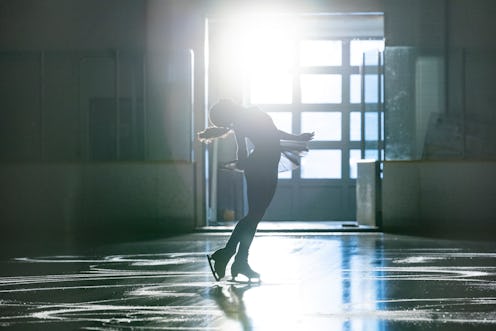Entertainment
How Kaya Scodelario Protected Her Mental Health During The Intense 'Spinning Out' Scenes

Early on it’s revealed that the name of Netflix’s new show set against the backdrop of elite figure skating has a double meaning; two of Spinning Out’s protagonists, Kat Baker, a 21-year-old skating phenom and her mother Carol, an ice queen who retired her skates decades ago, are both secretly living with bipolar disorder. By the end of the season, “spinning out” acquires yet another meaning: a metonym for how the lies they tell to hide their disorder disrupt their lives and relationships.
For Kaya Scodelario, who plays Kat, preparation for the leading role obviously included learning to ice skate. Scodelario says that she went from holding onto the walls around the rink to being able to skate backwards and spin, thanks to a 3-week on-set bootcamp with choreographer Sarah Kawahara (I, Tonya). But as physically rigorous as playing Kat is, it’s the character’s emotional arc that is the most daunting to take on.
Bustle talked to Scodelario about what how she handled playing a character struggling with her mental health.
What went into preparing to play someone living with bipolar?
KS: I have personal experience with bipolar in my family. It's something that I have always been wary of portraying onscreen because I've seen it done wrong and insensitively so many times. But when the script came through, I knew that Sam Stratton, our showrunner, had really done her research.
From there, I looked into a charity in England called MIND. They were really smart, just [helped me] give Kat all the right kind of details. I also looked into YouTubers that were former figure-skaters talking about abuse within skating. I found some really brave, really great young YouTubers that had spoken about their experiences publicly.
Did anything stand out that you carried into your performance?
KS: The idea that they have to appear perfect at all times was something that came up over and over again. The pressure that young people put on themselves to stay completely other-worldly. Figure skating is about the talent and technique, but a lot of appearance goes into it. For anyone struggling with mental health, that can be incredibly overwhelming. I mean, it's something that's overwhelming for everybody.
I always had in the back of my mind that Kat needs to have this mask of perfection on all the time. She's never late, she pays her bills on time, she knows exactly how much money she has in the bank account. Because she needs to feel completely in control of the image of herself.
Skating is almost the setting for the show rather than the premise. It’s really about the relationships between the Baker women — Kat, her mother Carol (played by January Jones) and sister Serena (played by Willow Shields).
KS: I don't have any siblings and I've always kind of dreamt of it. When I met Willow we like instantly became like best friends, and like sisters. I felt protective of her straight-away.I just wanted to look after her and I wanted her to be alright. I kept making sure she was drinking enough water and eating.
At the core of it, it's the story of these two generations women that tear each other to pieces and are incredibly volatile towards each other but love each other more than anything else in the world. They can't bear to not be in each other's lives. And they build a safety net around each other.
Me and January, we're both mothers and we just kind of bonded instantly. And Willow fit into that perfectly. We'd do dinner together. We have our own little Baker family side group chat that we talk in. I think we all knew that we needed to build that bond as much as possible.
Do any scenes stand out as especially difficult to film?
KS: The stuff that stands out for me is whenever I was acting with January when she was in a manic state. That was really hard for me. It was really quite triggering.
It's something that I knew going into the show that I would have to be careful about and to make sure that I was protecting my own mental health throughout filming. January’s performance was so good, so real, that it took me right back to being a child and my personal situation that I've been in like that. At the end, we'd go — me and her — and we'd sit in one of our trailers with make-up running down our faces and looking crazy and we'd talk it through, and we'd bond. We'd make sure that we were back to being us afterwards.
Did you have any safeguards or supports for your mental health in place during filming?
Our job is really weird. We put ourselves through these emotions and we shoot them for 18 hours a day and then we go home to silence and that can be really, really strange. I had my family with me, which really helped. I had my husband and my son and my best friend. I think she probably was the biggest help, she was just sort of there every day, in the evening, waiting with a glass of wine and we would sit and we would talk and she would ask about filming, but then we'd talk about normal things in our lives, and her relationships and her problems. I think looking back on it, it was her way of getting me back every evening.
We had all these incredible women around us, we had Sam, we had our producer, our director. Everyone just wanted to tell this story as truthfully as possible, but we also wanted it to be a good set. That's something that's really important to me.
This interview has been edited and condensed.
This article was originally published on